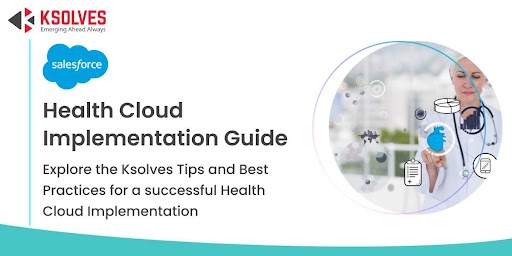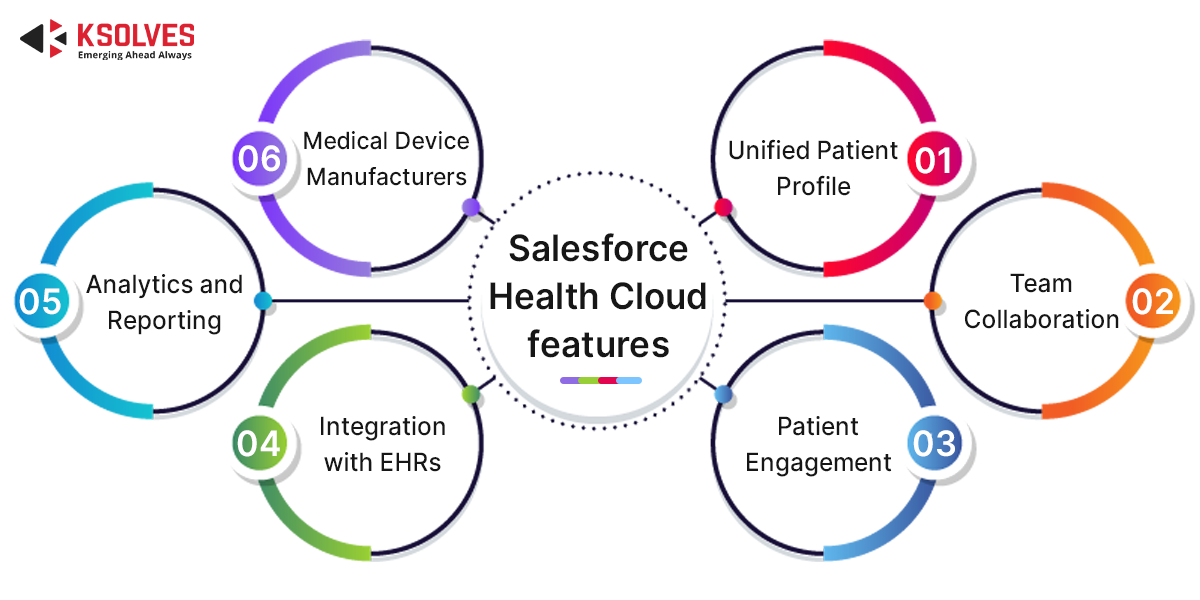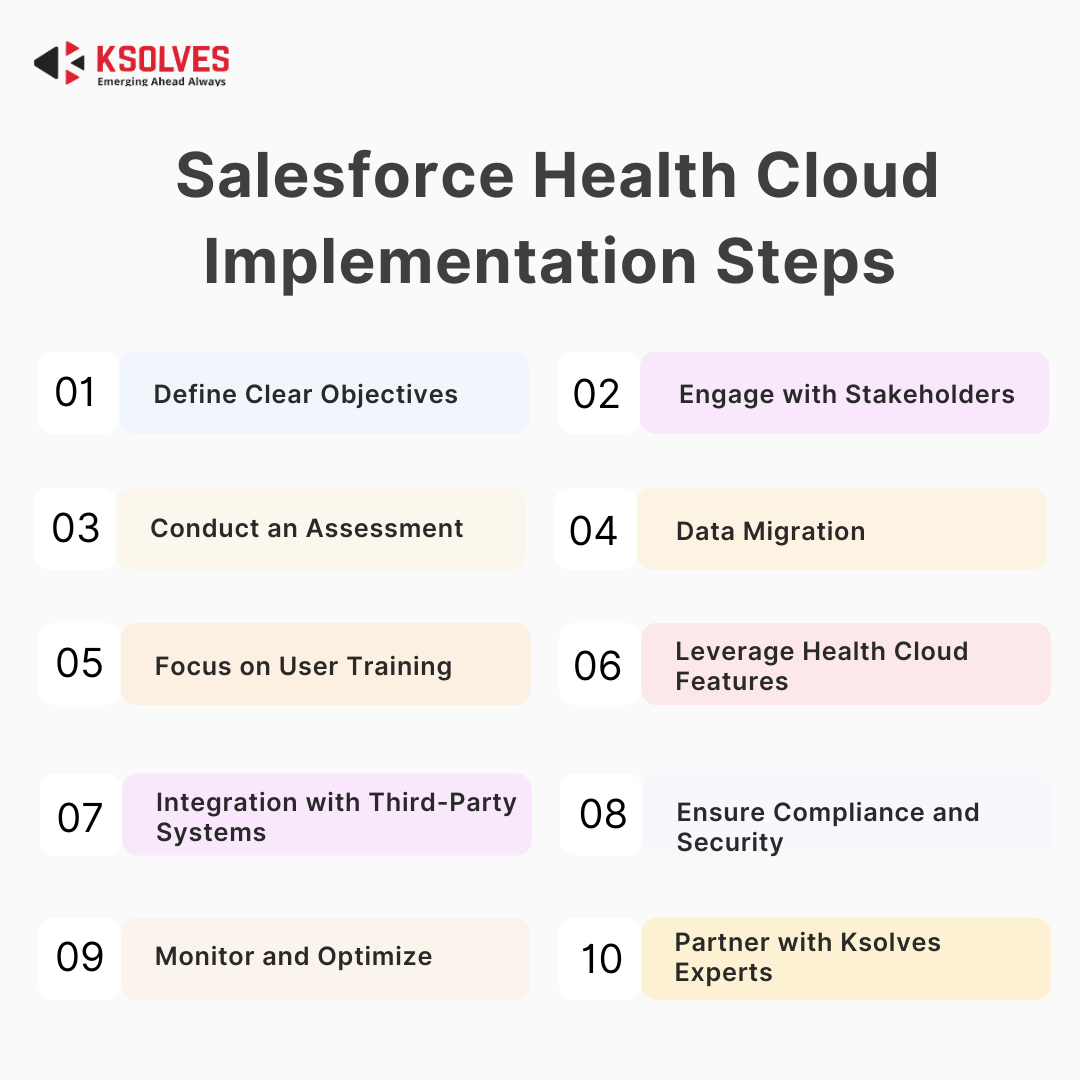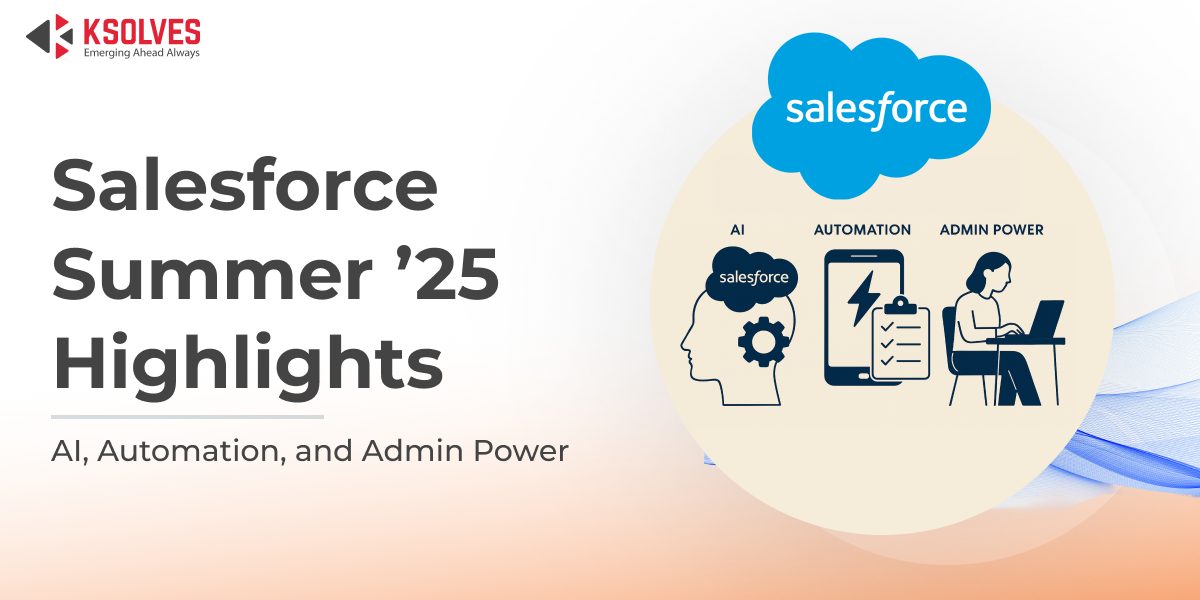Best Practices and Tips For Salesforce Health Cloud Implementation
Salesforce
5 MIN READ
August 13, 2024
![]()

In today’s rapidly evolving world, the healthcare industry plays a vital role in everyone’s lives. Managing patient data effectively and providing personalized care is essential for healthcare providers to operate successfully.
This is where Salesforce Health Cloud comes in, a solution specifically designed to meet the needs of healthcare professionals by enhancing patient relationships and empowering them to deliver the best care possible. Implementing Salesforce Health Cloud can be a game-changer, significantly improving patient care and overall operational efficiency.
In this blog, we will explore the Salesforce Health Cloud Implementation Guide with its benefits, challenges, and practices. You’ll gain valuable insights and tips for achieving a successful implementation.
Introduction to Salesforce Health Cloud
Salesforce Health Cloud is an advanced Patient Relationship Management (PRM) platform that centralizes patient data, enabling healthcare providers to deliver personalized care and improve patient outcomes. By integrating information from various sources, such as electronic health records (EHRs), wearables, and medical devices, Health Cloud creates a comprehensive patient profile that supports informed decision-making.
This data-driven approach not only enhances patient engagement but also allows healthcare providers to manage care more effectively. Additionally, Salesforce Health Cloud ensures compliance with healthcare regulations like the Health Insurance Portability and Accountability Act (HIPAA), while fostering collaboration among care teams and streamlining workflows to improve the overall quality of care.
Features of Salesforce Health Cloud
This Salesforce platform provides some advanced features designed to support healthcare organizations.
-
Unified Patient Profile
Salesforce Health Cloud combines all patient data from various sources and puts them into one. It will provide a centralized view that displays the medical history, treatment plans, and medications, ensuring that healthcare providers completely understand the patient’s health status.
-
Care Team Collaboration
Health Cloud facilitates seamless collaboration among care team members. It enables care coordinators, doctors, nurses, and other healthcare professionals to communicate and share information in real-time, ensuring coordinated and efficient patient care.
-
Patient Engagement
Healthcare providers can interact with patients through individualized communication channels with Health Cloud. Better participation and adherence to treatment regimens are promoted by the ability of patients to access their health information, make appointments, and receive reminders.
-
Analytics and Reporting
Healthcare companies can monitor key performance indicators (KPIs) and provide informative reports with Health Cloud’s analytics features. This data-driven strategy aids in trend identification, increases operational effectiveness, and improves the standard of patient care.
-
Integration with EHRs
Health Cloud seamlessly integrates with existing EHR systems, ensuring that patient data is always up-to-date and accessible. This integration eliminates data silos and enhances the accuracy and reliability of patient information.
-
Salesforce Health Cloud Across the Industry
Salesforce Health Cloud is a versatile platform used across various sectors including the healthcare industry. In hospitals, it improves patient management and team communication. In primary care, it helps track patient health and manage appointments. For insurance companies, it streamlines claims and customer service, and in research, it supports data collection and patient engagement.
-
Hospitals and Health Systems
Hospitals and health systems use Health Cloud to manage patient relationships, coordinate care, and improve operational efficiency. The platform helps streamline patient intake, discharge processes, and follow-up care, ensuring a smooth patient journey.
-
Pharmaceutical Companies
Pharmaceutical companies leverage Health Cloud to manage patient support programs, track medication adherence, and provide personalized care. The platform enables pharma companies to engage with patients and healthcare providers, enhancing the overall patient experience.
-
Medical Device Manufacturers
Medical device manufacturers utilize Health Cloud to manage product information, track device usage, and provide support to healthcare providers and patients. The platform helps in ensuring compliance with regulatory requirements and improving device utilization.
Salesforce Health Cloud Implementation Step-By-Step Process
Implementing Salesforce Health Cloud to improve patient experience involves several key steps to ensure a successful deployment. These steps include:
-
Define Clear Objectives
Before embarking on the Salesforce Health Cloud implementation, it is crucial to establish clear and measurable objectives. These objectives should align with your organization’s overall goals and focus on areas such as improving patient engagement, streamlining workflows, enhancing data accuracy, and ensuring compliance with healthcare regulations. By defining these objectives upfront, you can create a focused roadmap for implementation and measure the project’s success.
-
Engage Stakeholders Early
Involve key stakeholders from the beginning of the project. This includes healthcare professionals, IT staff, compliance officers, and other relevant team members. Engaging stakeholders early ensures that their needs and concerns are addressed throughout the implementation process. Their input is vital in shaping the project’s scope, selecting the right features, and ensuring that the system meets the organization’s needs.
-
Conduct Needs Assessment
A comprehensive needs assessment is essential to identify the specific requirements of your organization. This involves analyzing current workflows, identifying pain points, and understanding the unique needs of your patients and staff. The assessment should also include a review of existing systems to determine what data and functionalities need to be migrated or integrated into Salesforce Health Cloud.
-
Plan for Data Migration
Data migration is a critical step in the implementation process. Develop a detailed plan to migrate patient records, medical histories, and other essential data from legacy systems to Salesforce Health Cloud. Ensure data integrity and accuracy during the migration process. This step often involves mapping data fields, cleaning up outdated or duplicate records, and testing the migration process to avoid any disruptions in patient care.
-
Focus on User Training
Training is a key factor in the success of Salesforce Health Cloud implementation. Provide comprehensive training programs tailored to different user roles, such as healthcare providers, administrative staff, and IT personnel. Training should cover both the technical aspects of the system and its application in day-to-day operations. Continuous training and support should also be offered post-implementation to ensure that users can fully leverage the platform’s capabilities.
-
Leverage Health Cloud Features
Maximize the use of Salesforce Health Cloud’s robust features, such as patient management, care coordination, and secure communication tools. Customize the platform to fit your organization’s workflows, whether it’s for managing patient appointments, tracking health outcomes, or automating administrative tasks. Take advantage of Health Cloud’s analytics tools to gain insights into patient care and operational efficiency.
-
Integrate with Other Systems
Salesforce Health Cloud should not operate in isolation. Integrate it with other essential systems, such as Electronic Health Records (EHR), billing systems, and third-party applications. This integration ensures a seamless flow of information across different departments, improving efficiency and reducing the risk of errors. APIs and middleware can be used to facilitate smooth data exchange between Health Cloud and other systems.
-
Ensure Compliance and Security
Compliance with healthcare regulations such as HIPAA (Health Insurance Portability and Accountability Act) is non-negotiable. Implement robust security measures to protect patient data, including encryption, access controls, and regular audits. Work closely with your legal and compliance teams to ensure that Salesforce Health Cloud meets all regulatory requirements. Regularly update your security protocols to address new threats and vulnerabilities.
-
Monitor and Optimize
Post-implementation, continuous monitoring is necessary to ensure that Salesforce Health Cloud is functioning as expected. Use the platform’s built-in analytics and reporting tools to track performance metrics, user adoption, and patient outcomes. Regularly review these metrics and make adjustments to optimize system performance. Solicit feedback from users to identify areas for improvement and address any issues promptly.
-
Partner with Experts
Consider partnering with experienced Salesforce implementation experts or consultants who specialize in Health Cloud. These experts can provide valuable insights, guide you through complex implementation challenges, and ensure that best practices are followed. They can also assist with customization, integration, and training, ensuring a smooth and successful deployment.
By following these steps, organizations can effectively implement Salesforce Health Cloud, improving patient care, operational efficiency, and overall healthcare outcomes.
Tips for a Successful Health Cloud Implementation
Implementing Salesforce Health Cloud can be a complex process, but following these tips can help ensure a successful deployment:
-
Enable Person Accounts
Since Person Accounts let you handle patients as individual data instead of merely corporate entities, they are crucial to Salesforce Health Cloud.
Enabling Person Accounts combines the attributes of contacts and accounts to present a single, comprehensive picture of every patient. This configuration facilitates more efficient patient data management for healthcare organizations because every record contains a wealth of personal information, medical history, and interactions. It also promotes improved care coordination by guaranteeing that healthcare providers have easy access to all pertinent patient data.
-
Determine the Features They want to install
Numerous capabilities are available with Salesforce Health Cloud, including solutions for secure communication, care coordination, and patient administration. Before deployment, it is critical to ascertain whether features are in line with the requirements of your firm.
This entails assessing your present procedures and determining which ones can be enhanced by utilizing Health Cloud’s functionalities. Setting feature priorities guarantees efficient resource allocation and a smooth implementation process. This stage also helps you avoid needless complexity by concentrating exclusively on the tools that will bring the greatest benefit to your company.
-
Use Standard Components Possible
A range of standard components included with Salesforce Health Cloud are intended to address common healthcare requirements. It is best to use these common components rather than unique solutions whenever possible. It is simpler to develop, maintain, and upgrade standard components.
Additionally, Salesforce provides complete support for them, guaranteeing compatibility with upcoming updates and new features. Your company can save money and time on custom development while maintaining the necessary functionality by utilizing off-the-shelf components.
-
Consider Patient Communication
Successful patient communication is essential to the provision of healthcare. Salesforce Health Cloud offers a range of patient communication capabilities, such as care plan updates, appointment reminders, and secure messaging. It’s crucial to think about how these communication tools will fit into your workflow while using Health Cloud.
Make sure that communication channels are safe, easy for patients to use, and compliant with HIPAA and other healthcare laws. Additionally, adjust your communication techniques to your patient population’s varied demands, considering language preferences and preferred modes of communication (e.g., phone, email, or SMS).
-
Integration Plan & Middleware
Integration with other systems, including third-party apps, billing systems, and Electronic Health Records (EHR), is frequently necessary for a successful Health Cloud deployment. It is essential to plan for these integrations to guarantee a smooth information transfer between various platforms.
Middleware solutions can serve as an intermediary between Salesforce Health Cloud and other systems, thereby facilitating these integrations. By managing data translation, synchronization, and communication between various systems, middleware streamlines the integration process. Better patient care and operational efficiency result from an integration strategy that is well-planned and guarantees that all patient data is appropriately captured and readily available.
Industries Representing Salesforce Health Cloud
Salesforce Implementation works for a range of industries within the healthcare ecosystem. Industries include:
-
Pharmaceutical Research & Development
When we talk about pharmaceutical industries, the implementation of Health Cloud works on managing patient data and coordinating clinical trials. They need to make sure that the solution meets the regulatory requirements and optimizes the drug development process.
-
Hospitals and Healthcare Systems
The usage of Health Cloud in hospitals allows to track the treatments, manage patient relationships, and coordinate care across different departments. This automatically improves the operational efficiency and improve patient outcomes.
-
Health Insurance Providers
Health insurers make the use of Health cloud to manage the policyholder’s data, optimize the claims processing, and give personalized care recommendations to enhance customer satisfaction.
-
Medical Device Manufacturers
Manufacturing companies that relate to medical devices leverage Health Cloud to track product usage, monitor patient outcomes, and ensure that compliance meets with the latest industry trends.
How Salesforce Health Cloud is Benefiting Various Providers?
Implementing Salesforce Health Cloud offers multiple benefits to healthcare providers across different industry verticals that are:
-
Enhance Patient Engagement
By implementing the Health Cloud, you will get the advanced tools for personalized communication that allows providers to engage with patients through reminders, education content, and care plans, to get outcomes.
-
Improve Patient Care
By centralizing patient data and care plans, Health Cloud enables seamless collaboration across providers, ensuring everyone involved in a patient’s care is on the same page, lowering the chance of errors, and enhancing care quality.
-
Real-Time Data Analytics
Providers get real-time access to detailed patient data such as medical history, current medications, and treatment plans. This enables healthcare workers to make educated decisions more rapidly, improving patient outcomes.
-
Optimize Administrative Processes
Health Cloud automates many administrative tasks, such as scheduling appointments, processing billing, and managing patient records. This reduces the burden on healthcare staff, allowing them to focus more on patient care.
Challenges During the Implementation of Health Cloud
Implementing Salesforce Health Cloud can be complex and challenging, requiring careful planning and execution. Some common challenges include:
- Data Integration and Migration: Integrating existing systems with Salesforce Health Cloud and migrating data from legacy systems becomes complex. It also makes sure to focus on data accuracy, consistency, and integrity during the process and address issues.
- Customization and Configuration: Healthcare providers often have unique workflows and requirements that necessitate significant customization of the Health Cloud.
This balances the need for customization with maintaining a scalable and maintainable system to make it proper. - Regulatory Compliance: Ensuring that the implementation meets all relevant healthcare regulations, such as HIPAA, can be a complex process. Providers must carefully manage patient data and system configurations to ensure full compliance, which can be resource-intensive.
- User Adoption and Training: Getting healthcare professionals to adopt a new system can be a challenge, particularly if they are accustomed to legacy systems. Adequate training and change management strategies are essential to ensure that staff can use Health Cloud effectively.
- Cost and Resource Allocation: Implementing a Health Cloud can be costly, requiring significant technological and human resources investments. Organizations must carefully manage budgets and allocate resources efficiently to ensure the project’s success without overextending themselves.
Leverage Salesforce Health Cloud’s Customization Capabilities
Take advantage of Health Cloud’s customization features to tailor the platform to the organization’s specific needs. This includes configuring workflows, user interfaces, and communication channels.
-
Provide Comprehensive Training
Invest in comprehensive training programs for all users to ensure they are comfortable using the platform. This includes role-based training tailored to the specific needs of different user groups.
-
Monitor and Optimize
Continuously monitor the platform’s performance and gather feedback from users. Use this feedback to identify areas for improvement and optimize the platform’s functionality.
Best Practices for a Salesforce Health Cloud Implementation
In addition to the tips mentioned above, following these best practices can further enhance the success of a Salesforce Health Cloud implementation:
-
Establish a Governance Framework
Create a governance framework to oversee the implementation process and ensure that it aligns with the organization’s goals and objectives. This includes defining roles and responsibilities, establishing decision-making processes, and setting up regular review meetings.
-
Prioritize Security and Compliance
Ensure that the implementation process adheres to industry standards and regulatory requirements for data security and privacy. This includes implementing robust security measures and conducting regular audits.
-
Foster a Culture of Collaboration
Encourage collaboration among care team members and other stakeholders. Health Cloud’s success depends on effective communication and teamwork, so fostering a culture of collaboration is essential.
-
Plan for Scalability
Design the implementation plan with scalability in mind. As the organization grows, the platform should be able to accommodate increased data volumes and additional users without compromising performance.
-
Continuously Improve
Adopt a continuous improvement approach to the implementation process. Regularly review and assess the platform’s performance, gather user feedback, and make necessary adjustments to enhance its functionality.
Why Choose Ksolves for a Salesforce Health Cloud Implementation?
Ksolves is a leading Salesforce implementation partner with extensive experience in implementing Salesforce for healthcare organizations. Here are some reasons why Ksolves is the ideal choice for your Health Cloud implementation:
-
Expertise and Experience
Ksolves has a team of certified Salesforce experts with deep knowledge and years of experience in implementing Health Cloud. They have successfully delivered numerous projects for healthcare clients, ensuring high-quality and timely deployments.
-
Offer Services
Ksolves offers a full range of services, including needs assessment, planning and strategy, data integration, customization, training, and support. Their end-to-end approach ensures a seamless implementation process.
-
Customer-Centric Approach
Ksolves is committed to delivering solutions that meet the unique needs of each client. They work closely with healthcare organizations to understand their requirements and provide tailored solutions that drive value.
-
Proven Track Record
Ksolves has a proven track record of successful Health Cloud implementations, with numerous satisfied clients. Their expertise and dedication to excellence make them a trusted partner for healthcare organizations.
-
Continuous Support
Ksolves provides proceeding support to ensure that the Health Cloud platform continues to meet the evolving needs of healthcare organizations. Their support services include regular updates, maintenance, and optimization.
Success Story of Ksolves Client
One of the Ksolves clients working in the pharmaceutical industry and facing issues with job listings that directly impact job fulfillment.
By developing a Salesforce Digital Experience Site using Lightning Web Components (LWC), Ksolves optimized its client experience. The Salesforce Health Cloud Implementation solution by Ksolves helps in connecting job seekers with available positions.
How Ksolves Helped Them?
- Implemented custom metadata for precise job filtering by location and category.
- Integrated a calendar component in LWC to manage interview slots and prevent double bookings.
- Enabled secure registration for job seekers and partners, with logic to prevent duplicate accounts.
This successful Salesforce implementation solution enhanced recruitment efficiency and optimized data management, significantly improving the client’s overall business performance.
For more information about the success story and for implementing the solution in the healthcare industry, you can contact us at support@ksolves.com.
Conclusion
Healthcare firms can change the way they manage patient relationships and provide treatment by implementing Salesforce Health Cloud. By using the advice and best practices found in this blog, healthcare providers may guarantee a smooth deployment and make the most of the platform’s features. For a smooth and successful Health Cloud installation, Ksolves is the perfect partner thanks to its knowledge and extensive service offering. Elevate the quality of your patient care by embracing the future of healthcare with Salesforce Health Cloud.
![]()






AUTHOR
Salesforce
Md. Asad Khan, an expert Technical Project Manager at Ksolves, who is a certified Salesforce architect at Ksolves, brings 7+ years of experience. He specializes in FSL, B2B, Service & Sales Cloud, and Non-profit cloud, excelling in APEX, Aura Component Framework, Lightning Components, Triggers, Visualforce, and creating insightful dashboards and reports.
Share with